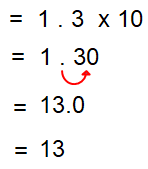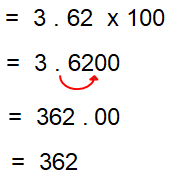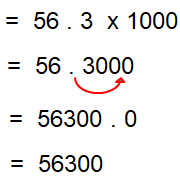MULTIPLYING DECIMALS BY 10 100 AND 1000
Subscribe to our ▶️ YouTube channel 🔴 for the latest videos, updates, and tips.
When we multiply decimals, accordingly the number of zeros that we have in 10, 100, 1000…etc. we will move the decimals.
Multiplying a decimal by 10 :
1.3 x 10
Here, we have 10, it has one zero. So we have to move the decimal point to the right of one digit.

Multiplying a decimal by 100 :
3.62 x 100
Here, we have 100, it has two zero. So we have to move the decimal point to the right of two digit.

Multiplying a decimal by 1000 :
56.3 x 1000
Here, we have 1000, it has three zero. So we have to move the decimal point to the right of three digit.

Example 1 :
Find :
a) 38 x 10
b) 9 x 100
c) 3.2 x 10
d) 0.8 x 10
e) 0.71 x 100
f) 2.8 x 100
g) 0.6 x 100
h) 0.83 x 100
i) 1.89 x 104
j) 0.053 x 103
k) 0.0583 x 1000
l) 0.187 x 100000
Solution :
a) 38 x 10
While multiplying an integer by 10, 100,. ......... etc, we have to add 0 next to it. So, the answer is 380.
b) 9 x 100
Multiplying 9 by 100, we will get 900.
c) 3.2 x 10
- Number of digits we have after the decimal = 1
- Number of zeroes we have in 10 = 1
- Moving the decimal one digit to the right, we get 32.
d) 0.8 x 10
- Number of digits we have after the decimal = 1
- Number of zeroes we have in 10 = 1
- Moving the decimal one digit to the right, we get 8.
e) 0.71 x 100
- Number of digits we have after the decimal = 2
- Number of zeroes we have in 100 = 2
- Moving the decimal two digits to the right, we get 71.
f) 2.8 x 100
- Number of digits we have after the decimal = 1
- Number of zeroes we have in 100 = 2
- Moving the decimal two digits to the right, we add one 0. So, the result is 280.
g) 0.6 x 100
- Number of digits we have after the decimal = 1
- Number of zeroes we have in 100 = 2
- Moving the decimal two digits to the right, we add one 0. So, the result is 60.
h) 0.83 x 100
- Number of digits we have after the decimal = 2
- Number of zeroes we have in 100 = 2
- Moving the decimal two digits to the right. So, the result is 83
i) 1.89 x 104
- Number of digits we have after the decimal = 2
- Number of zeroes we have in 104 = 4
- Moving the decimal four digits to the right, we add two 0's. So, the result is 18900
j) 0.053 x 103
- Number of digits we have after the decimal = 3
- Number of zeroes we have in 103 = 3
- Moving the decimal three digits, we get 53.
k) 0.0583 x 1000
- Number of digits we have after the decimal = 4
- Number of zeroes we have in 1000 = 3
- Moving the decimal three digits to the right. So, the answer is 58.3
l) 0.187 x 100000
- Number of digits we have after the decimal = 3
- Number of zeroes we have in 100000 = 5
- Moving the decimal five digits to the right. We have to add two 0's. So, the answer is 18700.
Example 2 :
a) 9.6 ÷ 10 =
b) 16.08 ÷ 10 =
c) 132.22 ÷ 10 =
d) 78.2 ÷ 10 =
e) 9.6 ÷ 100 =
f) 16.08 ÷ 20 =
g) 132.22 ÷ 100 =
h) 78.2 ÷ 20 =
Solution :
a) 9.6 ÷ 10 =
- Number of digits before the decimal = 1
- Number of 0's in 10 = 1
- Moving one digit before the decimal, we get 0.96
b) 16.08 ÷ 10 =
- Number of digits before the decimal = 2
- Number of 0's in 10 = 1
- Moving one digit before the decimal, we get 1.608
c) 132.22 ÷ 10 =
- Number of digits before the decimal = 3
- Number of 0's in 10 = 1
- Moving one digit before the decimal, we get 13.222
d) 78.2 ÷ 10 =
- Number of digits before the decimal = 2
- Number of 0's in 10 = 1
- Moving one digit before the decimal, we get 7.82
e) 9.6 ÷ 100 =
- Number of digits before the decimal = 2
- Number of 0's in 100 = 2
- Moving one digit before the decimal, so we write one 0. We get 0.096
f) 16.08 ÷ 20 =
= 16.08 / (2 x 10)
Dividing 16.08 by 2, we get
= 8.04/10
- Number of digits before the decimal = 1
- Number of 0's in 10 = 1
- Moving one digit before the decimal, we get 0.804
g) 132.22 ÷ 100 =
- Number of digits before the decimal = 3
- Number of 0's in 100 = 2
- Moving one digit before the decimal, we get 1.3222
h) 78.2 ÷ 20 =
= 78.2 / (2 x 10)
Dividing 78.2 by 2, we get
= 39.1/10
- Number of digits before the decimal = 1
- Number of 0's in 10 = 1
- Moving one digit before the decimal, we get 3.91
Subscribe to our ▶️ YouTube channel 🔴 for the latest videos, updates, and tips.
Recent Articles
-
Finding Range of Values Inequality Problems
May 21, 24 08:51 PM
Finding Range of Values Inequality Problems -
Solving Two Step Inequality Word Problems
May 21, 24 08:51 AM
Solving Two Step Inequality Word Problems -
Exponential Function Context and Data Modeling
May 20, 24 10:45 PM
Exponential Function Context and Data Modeling